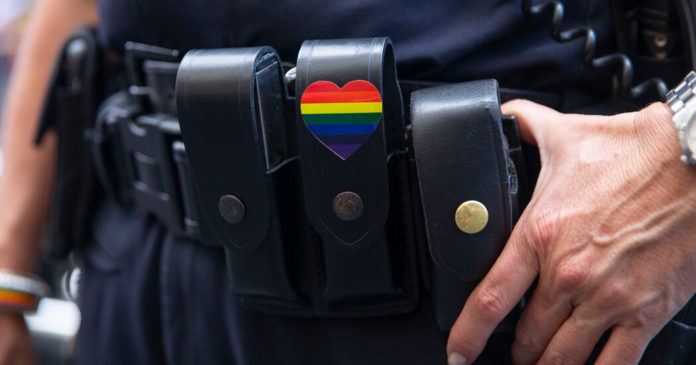
To the Editor:
Re “A Misstep by Organizers of Pride” (editorial, May 19):
I have to wholeheartedly disagree with your perception of the ban on uniformed police groups at New York’s Pride celebration as a misstep.
This is an appropriate and timely response to the collective trauma of a nation dealing with a year of reckoning regarding police brutality. For those of us who faced officers in riot gear, who were tear-gassed and shot at with rubber bullets less than a year ago while kneeling with our hands up in support of our Black community members, we respectfully ask officers to stay away.
For L.G.B.T.Q.+ officers, my response is this: You have an identity that is complex. But one part of that identity, as a police officer, makes me and others feel unsafe. This is a consequence of the policies of the unions you belong to, qualified immunity that is your extraordinary privilege, and the unspoken blue line that makes it nearly impossible for good officers to enact change in a dysfunctional system.
So yes, your uniform scares me. You need to determine if the two identities you hold are compatible. I don’t believe they are … yet.
So come to Pride — but leave your uniform at home.
Megan Moilanen
San Jose, Calif.
To the Editor:
As a left-of-center gay man living in Manhattan, I am disgusted by the decision to expel the Gay Officers Action League from the Pride parade. This boneheaded decision totally flies in the face of our alleged inclusiveness, and is hurtful to gay officers who are brave enough to “come out” and who are helping to change attitudes within the department.
There’s no sugarcoating this. This decision is clearly a kneejerk reaction to much-needed police reform. However, this only kicks and hurts those who are our friends. Shame on those who have made this destructive, and at best very misguided, decision.
Kurt Wieting
New York
To the Editor:
Truthfully, I am biased. I have been arrested because of the color of my skin. As a result, I have to monitor and think twice about my behavior around the police. “Will this action get me targeted?” I think to myself. “Will I be viewed as a threat?”
This has gone on for so long that it has become reflexive whenever I see the men and women in blue. It is impossible that I can be who I normally am around police officers. Therefore I applaud the decision to decrease the police presence at the Pride march since so many of my queer brethren react how I do.
It is antithetical to the idea of Pride — a time to celebrate who we are, a time not to be ashamed — to have a group of people who cause a large portion, if not majority, of us to recoil.
Frankly, I am surprised by the Times editorial. Until the vast majority of queer people are comfortable with it, the police presence should be kept to a minimum.
Gabriel Klansky
Brooklyn
To the Editor:
Thank you for your balanced editorial on the Pride organization’s misguided decision to ban police groups from the parade. You correctly point out that, for many years, gay men and lesbians at the parade were thrilled to have the police participate and were proud that there was an organization of L.G.B.T.Q. officers.
I also believe that the antagonism between the police and the L.G.B.T.Q. marchers is wildly overblown. In my 35 years at the parade, I have yet to see an unpleasant encounter with the cops. And although there surely have been some, I would not rush to judgment that the problem was police aggression. The cops around me at the parade have always been polite, helpful and often clearly supportive.
I will no longer participate in the parade though I am, in fact, a proud gay New Yorker. The political litmus test for inclusion is a step too far for me.
Peter Clark
New York
To the Editor:
Will this cycle never end? The oppressed become the oppressors, the marginalized become the marginalizers, the occupied become the occupiers. We see the disastrous effects of this cycle all over the world. This decision by the Pride parade organizers is shameful — nothing to have pride about.
Margaret Hurwitz
New York







